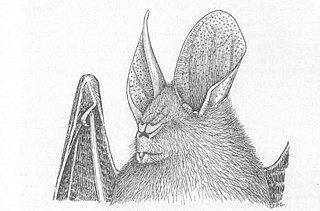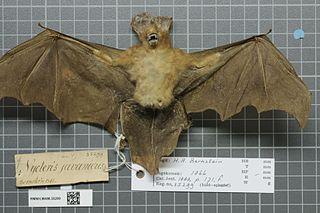
Nycteris comprises a genus of bats commonly called slit-faced or hollow-faced bats. They are grouped in the family Nycteridae. The bats are found in East Malaysia, Indonesia, and many parts of Africa.

Bate's slit-faced bat is a species of slit-faced bat frequently confused with Nycteris major. It is broadly distributed and common, living throughout many parts of Africa in forests and savannas.

The Ja slit-faced bat is a species of slit-faced bat that lives in the tropical and subtropical forests of Africa. Its habitat is fragmented and declining, and the species is therefore very rare. Logging and farming are currently the greatest threats to its habitat. The two known subspecies are N. m. avakubia and N. m. major.
Andersen's slit-faced bat is a slit-faced bat species found in East Africa. It has been recorded in Somaliland, through South Sudan and Ethiopia, into Kenya and Tanzania. No information is available on the population size of this species, which inhabits savanna habitats and semidesert.

The large slit-faced bat is a species of slit-faced bat with a broad distribution in forest and savanna habitats in West, Central, and East Africa. N. marica, is the available name for the southern savanna species if it is recognized as distinct from this species.

The hairy slit-faced bat is a species of slit-faced bat widely distributed throughout forests and savannas in Africa. Two recognized subspecies exist: N. h. hispida and N. h. pallida. Various forest populations in western and central Africa may represent separate species, although this had not been confirmed as of 2007.
The intermediate slit-faced bat is a species of slit-faced bat living in forest and savanna regions of west and central Africa. It is easily confused with Nycteris arge and Nycteris nana. It is broadly distributed, but is classified as near-threatened because of the threat of predicted habitat loss. It is much more restricted to true rainforest than is N. arge.

The Javan slit-faced bat is a species of slit-faced bat found on the Kangean Islands of Indonesia, Nusa Penida, Java, and West Timor. The species' population is decreasing.

The large-eared slit-faced bat, is a species of slit-faced bat which lives in forests and savannas throughout Africa. Nycteris vinsoni was once considered a synonym of N. macrotis, but it became recognized as a separate species in 2004. Some, however, still consider N. vinsoni to be a subspecies of N. macrotis, and consider N. macrotis a species complex.
Vinson's slit-faced bat is a species of slit-faced bat known only from two specimens. Both specimens were smoked out of a baobab tree in a national park in southern Mozambique. Virtually nothing is known about this species.
The dwarf slit-faced bat is a species of slit-faced bat living in forest and savanna regions of Central Africa. Two subspecies have been identified: N. n. nana and N. n. tristis.

The Egyptian slit-faced bat is a species of slit-faced bat broadly distributed throughout Africa and the Middle East. It is a species of microbat in the family Nycteridae. Six subspecies are known.

Wood's slit-faced bat is a species of slit-faced bat that lives in the dry savanna regions of Southern Africa. Its numbers are declining due to habitat loss from logging and farming, pesticide use, and the decline of baobab trees on which these bats depend for roost sites.








